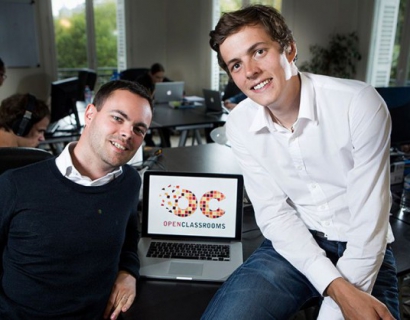Everything for  Business
Business
 Business
Business
 Business
Business
Pierre Dubuque founded the OpenClassrooms platform, which allows 400 teachers to train thousands of students in 128 countries around the world. The main difference is compulsory employment assistance to all graduates

Pierre Dubuque founded the OpenClassrooms platform, which allows 400 teachers to train thousands of students in 128 countries around the world. The main difference is compulsory employment assistance to all graduates
According to the College Board (a private American educational organization that assists students and helps educational organizations enroll students), the average cost of tuition and entrance fees in the US for the 2017-2018 academic year was $ 34,740 in private colleges, $ 9,970 for US citizens in state colleges and $ 25,620 for foreign citizens entering public universities.
Considerable sums, especially given the fact that the average income for the last 40 years with a tail has remained relatively the same with inflation. The cost of training in colleges rose over this period by 276%, accounting for 25% of the averaged income, and in 1971 it was only 7%. And while the slowdown in price growth is not expected. If we ignore the cost of training, the question remains whether the education system provides graduates with the skills necessary in the 21st century.
An alternative solution to this issue since 11 years is one bold, but at the same time nothing particularly remarkable twenty-nine-year-old guy, originally from Normandy (France). His company was called OpenClassrooms, and Pierre Dubuque himself is its founder and CEO. "I founded OpenClassrooms with my friend Mathieu Nebra four years ago, but this has been our hobby since 1999," says Dubuque.
Dubuque's mission is to make education more accessible. The educational online platform, based in Paris, brings together hundreds of staff involved in the development of the platform, which allows 400 teachers to train thousands of students per month in 128 countries. According to Dubuque, business is developing rapidly, showing growth of 150% each year and attracting approximately € 8 million of venture financing from BPI, Citizen Capital, Xavier Niel (NJJ Capital) and Alven Capital.
Their online course and educational programs are approved by the French state and recognized in 50 countries, although in the US they are not formally accredited yet. "Our system differs from traditional education in colleges, but in reality it is the same full-fledged student and university life. You have classes, there are teachers, a student team, a community of graduates, links and cooperation with employers, "says Dubuque.
"After the end of OpenClassrooms, you have three options for the development of events: either you find work as an employee, or you conduct your own activity as a freelancer, or you create your own company as an entrepreneur. And we provide resources and coaching for each of the three options. After graduation we congratulate you and all that, but the ultimate goal is to find you a job. It's our duty. "
OpenClassrooms are so confident that the students' skills will meet today's requirements when hiring, that the company even offers a guaranteed return of money to all graduates if they do not find work within six months after graduation. To date, OpenClassrooms graduates work in top companies such as Apple, Toyota, IBM, Louis Vuitton, Hewlett Packard, AXA, etc.
Despite the fact that Dubuque and Nebra themselves are still young, they have been doing this for a long time. In 1999 Nebra created software for online courses on creating websites. He wanted his friends to join him in the process of work, and found that the simplest way is, as a matter of fact, to draw up a course and share it on the Internet. Dubyuk joined his project in 2001 at the age of 11, and for the next ten years the creation of courses became their hobby. They all financed independently and attracted more than one hundred thousand subscribers a month. In 2007, they together decided to create an official company, while studying at the engineers: Dubuque - at the National Institute of Applied Sciences INSA in Lyon,
"We have students from more than a hundred countries, since we exist completely online, which means that we must be well versed in local standards of conformity and accreditation processes in order to be recognized in these countries. This is a laborious process, and the creation of a new program takes about three to four to nine years, depending on the country in which you live. " At the same time, we are working with universities to jointly create new programs, since they are already accredited and are a brand. We partnered with French Ivy League schools, including Polytechnique, Sciences Po and CentraleSupélec, as well as leaders in their field such as Google, Microsoft and IBM. We work with them to create programs and work with experts on their methods to develop a curriculum, "says Dubuque.
Their prices are 10-25 times lower than the cost of traditional training in college and usually range from $ 2,000 to $ 4,000, the amount includes curator support, coaching and a guaranteed job.
Real prices and competition for quality with educational systems based on traditional programs can affect the policy of restraining prices for training. "The education sector is ripe for competition. After a while we see tremendous opportunities for teaching skills in the field of exact sciences that we can provide and which will be required for future employees, "says Dubuque. "We want to find another faster, more flexible and cheaper way to retrain them."
With such momentum of growth and such market opportunities, it is surprising that OpenClassrooms does not receive more funding. "I think it can happen," Dubuque laughs, "but it also depends on how we build our company. We did not need money, because we were students. And we did not need to raise funds. And then we got some money, not very much in comparison with the scale of business and the market. "
What is in the plans for the future?
"We set ourselves the task by 2025, that one million of our graduates would be employed in a million jobs. Employers are interested in having students come to them, ready to start working immediately. Although we have been doing this for a long time, but now we are just at the beginning of the journey, this is a long story, but it is still only at the initial stage, the market and potential are huge, so we will continue to work on this. "
Forbes.ru
 What are you doing with your RV in the offseason?
What are you doing with your RV in the offseason?
 Adobe will buy online design startup Figma for $ 20 billion
Adobe will buy online design startup Figma for $ 20 billion
 To combat the gas crisis, Germany offers a new plan for cheap transit
To combat the gas crisis, Germany offers a new plan for cheap transit
 Porsche family seeks iPO buyout after tearful defeat
Porsche family seeks iPO buyout after tearful defeat
 Clubs and bars are popping up all over Manhattan, providing an alternative social hub and jobs.
Clubs and bars are popping up all over Manhattan, providing an alternative social hub and jobs.
This site uses cookies and other visitor identifiers for the convenience of each user. If you stay on our site after reading this message, it means that you have no objection to the use of these technologies. Learn more
